Intel Core i7-10700 vs Core i7-10700K Review: Is 65W Comet Lake an Option?
by Dr. Ian Cutress on January 21, 2021 10:30 AM EST- Posted in
- CPUs
- Intel
- Core i7
- Z490
- 10th Gen Core
- Comet Lake
- i7-10700K
- i7-10700
CPU Tests: Legacy and Web
In order to gather data to compare with older benchmarks, we are still keeping a number of tests under our ‘legacy’ section. This includes all the former major versions of CineBench (R15, R11.5, R10) as well as x264 HD 3.0 and the first very naïve version of 3DPM v2.1. We won’t be transferring the data over from the old testing into Bench, otherwise it would be populated with 200 CPUs with only one data point, so it will fill up as we test more CPUs like the others.
The other section here is our web tests.
Web Tests: Kraken, Octane, and Speedometer
Benchmarking using web tools is always a bit difficult. Browsers change almost daily, and the way the web is used changes even quicker. While there is some scope for advanced computational based benchmarks, most users care about responsiveness, which requires a strong back-end to work quickly to provide on the front-end. The benchmarks we chose for our web tests are essentially industry standards – at least once upon a time.
It should be noted that for each test, the browser is closed and re-opened a new with a fresh cache. We use a fixed Chromium version for our tests with the update capabilities removed to ensure consistency.
Mozilla Kraken 1.1
Kraken is a 2010 benchmark from Mozilla and does a series of JavaScript tests. These tests are a little more involved than previous tests, looking at artificial intelligence, audio manipulation, image manipulation, json parsing, and cryptographic functions. The benchmark starts with an initial download of data for the audio and imaging, and then runs through 10 times giving a timed result.
We loop through the 10-run test four times (so that’s a total of 40 runs), and average the four end-results. The result is given as time to complete the test, and we’re reaching a slow asymptotic limit with regards the highest IPC processors.

Google Octane 2.0
Our second test is also JavaScript based, but uses a lot more variation of newer JS techniques, such as object-oriented programming, kernel simulation, object creation/destruction, garbage collection, array manipulations, compiler latency and code execution.
Octane was developed after the discontinuation of other tests, with the goal of being more web-like than previous tests. It has been a popular benchmark, making it an obvious target for optimizations in the JavaScript engines. Ultimately it was retired in early 2017 due to this, although it is still widely used as a tool to determine general CPU performance in a number of web tasks.
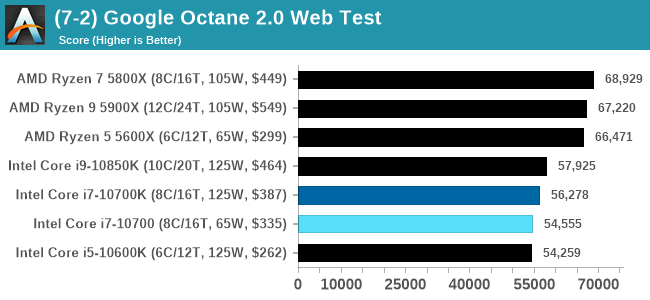
Speedometer 2: JavaScript Frameworks
Our newest web test is Speedometer 2, which is a test over a series of JavaScript frameworks to do three simple things: built a list, enable each item in the list, and remove the list. All the frameworks implement the same visual cues, but obviously apply them from different coding angles.
Our test goes through the list of frameworks, and produces a final score indicative of ‘rpm’, one of the benchmarks internal metrics.
We repeat over the benchmark for a dozen loops, taking the average of the last five.
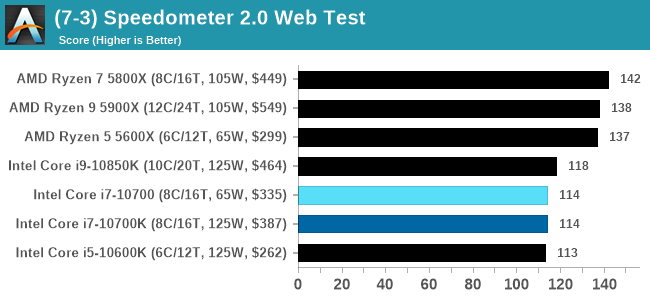
Legacy Tests
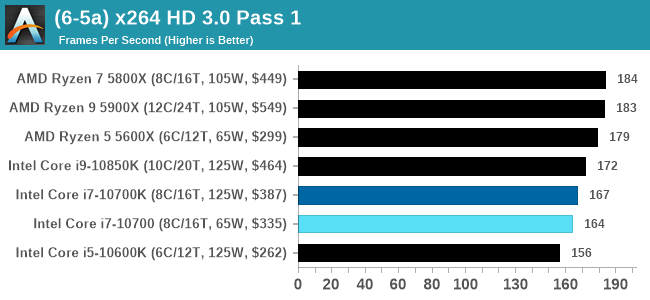
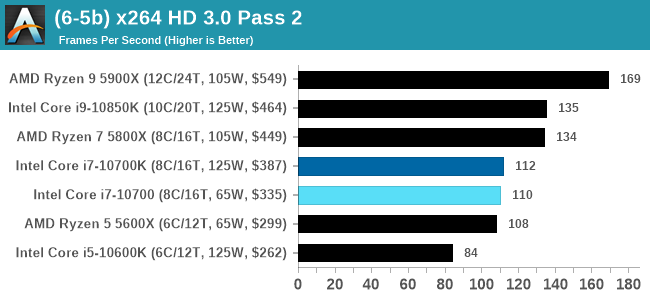
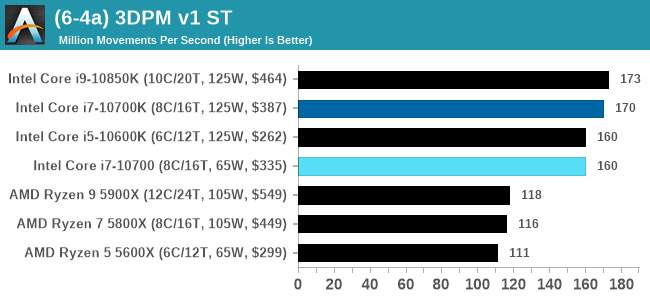
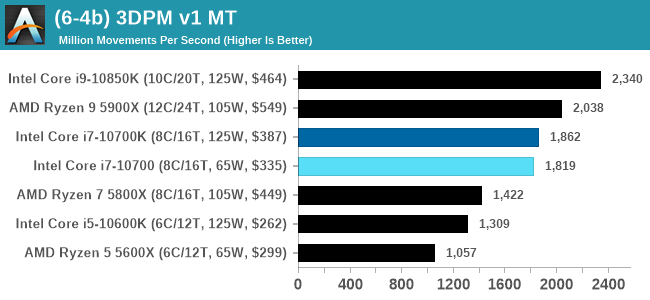
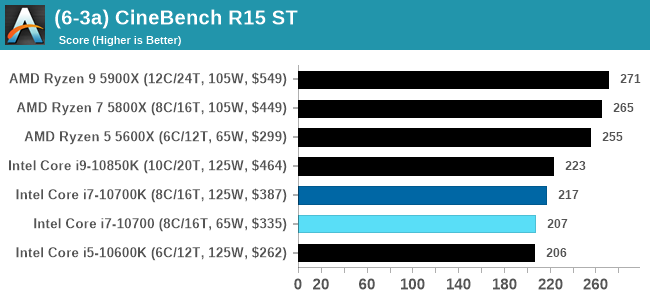
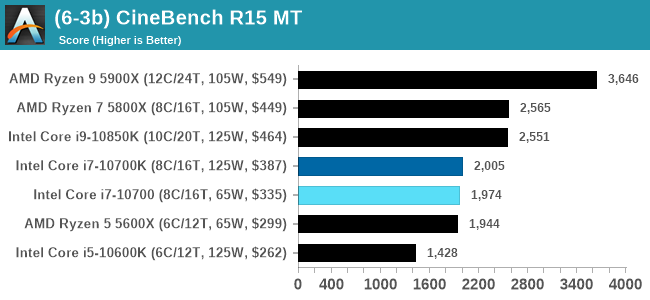


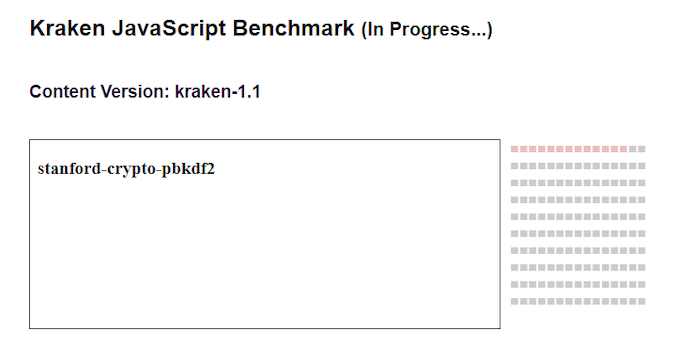
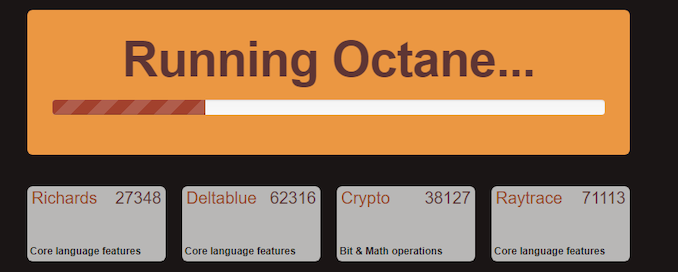
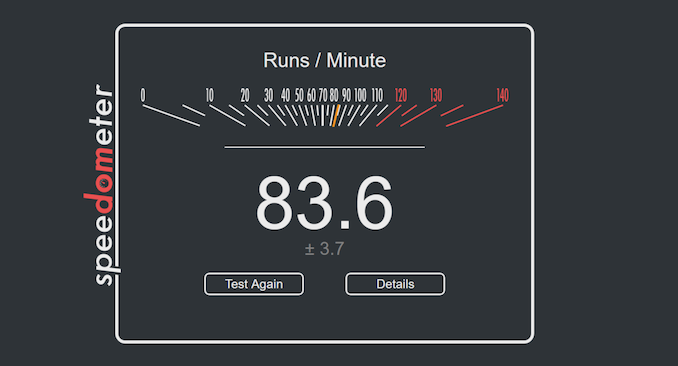








210 Comments
View All Comments
Oxford Guy - Sunday, January 24, 2021 - link
This site posted articles about overclocking that were done wildly, without true stability testing and with reckless amounts of voltage and you're going to now pretend that turning on XMP for RAM is some kind of terrible reckless matter?Oxford Guy - Sunday, January 24, 2021 - link
The thing is... if you wish to take a stand about JEDEC and company standards that's fine. Just don't post a lot of nonsensical reasons for it, like "Most users don't know how to plug in a computer so we're going to skip the plug for this review".Oxford Guy - Sunday, January 24, 2021 - link
Personally, here is all I'd say on the subject, were I to be taking your stand:'We use JEDEC standards for RAM speed because those are what AMD, Intel, and other CPU makers use to rate their chips. Anything beyond JEDEC is overclocking and is therefore running out of spec.
Although motherboard makers frequently choose to run CPUs out of spec, such as by boosting to the turbo speech and keeping it there indefinitely, and by including XMP profiles for RAM with lists of 'compatible' RAM running beyond JEDEC, it is our belief that the best place for a CPU's maximum supported RAM speech spec to come from is from the CPU's creator.
If anyone is unhappy about this standard we suggest lobbying the CPU makers to be more aggressive about officially supporting faster RAM speeds, such as by formally adopting XMP as a spec that is considered to be within spec for a CPU.
To compliment the goal of our JEDEC stance, are going to only create reviews using motherboards that fully comply with the turbo spec of vendors and/or disable all attempts by board makers to game that spec. If a board cannot be brought into full compliance we will refuse to post a review of it and any mention of it with the possible exception of a list of boards that run out of spec, are non-compliant.'
Qasar - Sunday, January 24, 2021 - link
Oxford Guy you seem to be quite unhappy about this review, and by other posts, the site as well, so if this site is so bad, WHY do you keep coming here ?Spunjji - Monday, January 25, 2021 - link
He's certainly not his own best advocate in that regard.I'd always defend someone's right to criticise aspects of something they otherwise like, but sometimes it goes a bit far.
Oxford Guy - Monday, January 25, 2021 - link
'but sometimes it goes a bit far.'Extreme vagueness + ad hom = extra fail.
Spunjji - Wednesday, January 27, 2021 - link
@Oxford Guy - 🙄1) That wasn't an ad-hominem - if you're going to do the "master debater" thing, at least learn to distinguish between commentary on the person and their argument.
2) Re: "extreme vagueness" - that was my personal opinion stated as a colloquialism. I don't owe anyone an annotated list of every comment you made, metric measurements of precisely how far they went, an objectively-defined scale of how far is too far, and a peer-reviewed thesis on the precise moment at which you exceeded that point.
Oxford Guy - Monday, January 25, 2021 - link
Ad hom... how unsurprising.To answer your question — This site is not bad. This site is good because people are able to give their honest opinions instead of living in a disgusting echo chamber like on ArsTechnica or Slashdot.
Perhaps that's where YOU should go instead.
Qasar - Tuesday, January 26, 2021 - link
why would i go there ? this site is top notch when it comes to reviews and comp hardware news. "This site is good because people are able to give their honest opinions " yes, but sometimes, some go to far with the whining and complaining :-)trenzterra - Friday, January 22, 2021 - link
Would be good if we could have some temperatures to compare as well. I used to buy the mid-end non-K Intel CPUs since I don't overclock but I always ended up with temperatures about 10 degrees higher than what most people report. With my latest build (ok, not that new now that it's actually a i5-6600k), I went for the K variant and temperatures are much better and in line with what most users report.